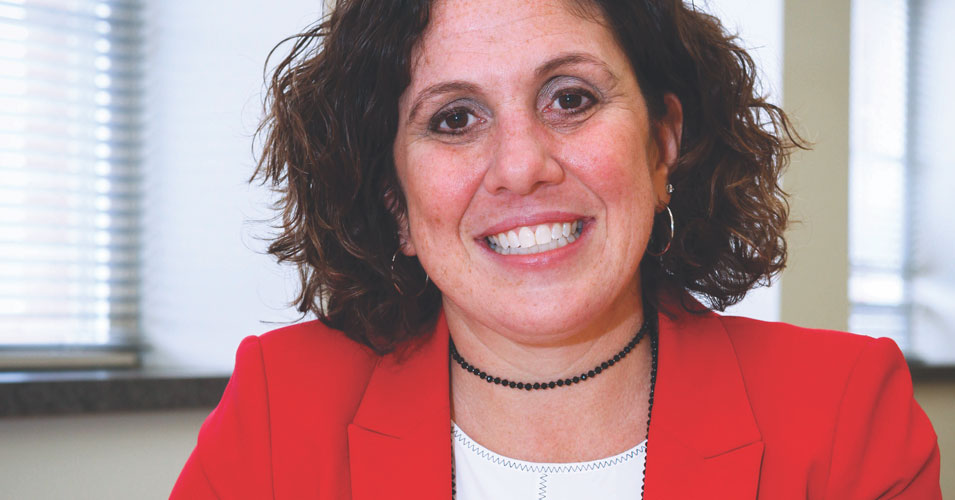Anyone who thinks of public education as impersonal and excessively bureaucratic probably hasn’t met Amy Evans, director of special education programs for the Syracuse City School District. With 22 years of education experience, and an amiable, steady demeanor, she approaches her role serving the city’s special education students as if she were born to do it.
Evans, 44, worked as a special education teacher, a vice principal, a principal and SCSD’s assistant director of special education before accepting her current position last summer. She earned her master’s degree in special education with a concentration in learning disabilities from Syracuse University. She has three children and lives in Cicero.
Evans says much has changed about special education since she started teaching.
“I really believe the most important change has been the level of accountability—for all roles—and how we are held to that higher standard with testing, programming, and quality IEPs (individualized education plans),” she says. “Also, we’ve forged some wonderful community relationships that have helped us to better support our students and families.”
“In this job, you can’t ever settle and say, ‘That’s right. I did it.’ Things are always changing and we always have to do better, and we have to make sure we are meeting every student’s IEP.” — Amy Evans
Specifically, Evans cites organizations such as Family-Student Support services, counseling services offered through Arise, Brownell Center for Behavioral Health, St. Joseph’s Hospital Health Center, and the student intervention program Promise Zone for helping to establish key support partnerships with the SCSD and families.
“Parents have always been great advocates for their children, but with all these supports in the community, we’ve brought it to another level,” says Evans.
The ever-improving ability to diagnose learning disabilities has kept the demand for services steady. “It is a lot of work,” Evans admits with a smile, “but it’s the right work.”
As parents have become more involved in advocating for their children, home-school partnerships have improved—to the benefit of students.
“The home-school partnership is so crucial. We only have our students for six to seven hours a day. We look to partner with families because we don’t want the goals to just be ‘school-day goals.’ We want them to really be lifelong goals.
But parents seeking special education services for their children can face a daunting process, Evans admits. She and the special education staff try to make sure that parents and caregivers feel knowledgeable and empowered through each of the steps. “My goal is to make sure parents are partners in it, and that we are working together.”
Long gone is the stigma that once was associated with special education. “It’s really about individual children, and giving them what they need to be successful,” Evans says. “We are also a very inclusive school district. In all of our buildings, we are educating students with disabilities alongside their general education peers. We are very proud of that.”
Overseeing the distribution of services in more than 30 different school buildings is no small task. But Evans tackles the challenge head-on.
“One of my goals is to appropriately align programs and services so that children can be in their home quadrant or neighborhood schools, alongside their peers,” she says. “Making sure the continuums are in place so that children do not have to switch schools in order to get the services they need is important to us.”
“I think the biggest challenge is that when you are looking at approximately 4,200 students—individualized programs for each student—that you’re not making sweeping decisions for all kids,” Evans adds. “It’s about individual kids. Sometimes that’s a challenge when you’re looking at numbers like that. We overcome that challenge by working with individual schools and teachers to make sure students’ needs are met.”
Evans has worked to stay connected to the district’s staff and earn their trust. Each school in the district has access to an administrative liaison at least once a week. “They are accessible to them at any time,” Evans says. “They each have an assistant director and clerical staff assigned to their schools, so it’s very easy for them to (get) support. I oversee the administrative staff and make sure I’m accessible to all schools.”
“We feel that communication is so important that we’re having monthly meetings with school administrators, special education teachers, related services staff,” Evans continues. “We have parent council meetings every other month. We rotate between morning and evening sessions, in case parents have daycare issues. We would love to have more parents attend. We also have some autism support groups set up.”
(The parent council—Special Education Community Advisory Council—next meets on Thursday, April 6, 6 to 7:30 p.m. Meetings are held at the Professional Development Center, 1005 W. Fayette St., Suite 1D, Syracuse.)
Evans, whose father was a teacher with the SCSD for 42 years, says she is always open to hearing from parents on just what they would like in terms of support. “We also partner with Parent University—a school district initiative to increase parent engagement—“to provide information on CSE meetings, or interpreting the IEP. It is important for me to be readily accessible to parents. They can call at any time, and it’s not unusual for them to just stop by.”
When asked how teachers have adjusted to the increasing demands of individualized education plans, Evans admits it’s not an easy responsibility to shoulder. Supporting teachers in their work is more important than ever.
“Balancing the needs of all students in a classroom is very difficult and it’s very important,” she says. “In July, we will be putting in place a yearlong professional development calendar. So our teachers will know about all the targeted professional development sessions that are available to them for the entire year. My philosophy is, we’ve become wonderful at individualizing programs for our students. We have to do the same for our teachers who are supporting them.”
Read: “Striving for Success: Back-to-school tips for parents of students with special needs”
Evans says while adjusting to the Common Core standards and changes in teacher evaluations has been challenging, the process improved accountability while re-emphasizing the need for educators to focus on what is most important.
“Everyone has realized that if we focus on the curriculum and the IEP goals, we’re doing the right thing. It’s been about aligning those goals to the Common Core. I think things are moving quicker in the classroom, and sometimes we have to employ methods and strategies to make sure our students with IEPs are getting everything they need.”
Helping students and their families’ plan for life after graduation is another important aspect of SCSD special education services. “We employ two transition counselors who work with students when they get to high school so that they are connected with services post-high school,” Evans says. “We have amazing transition services in the district, including Project Search, and partnerships with Onondaga Community College and Syracuse University.”
In many ways, everything special education educators and support staff do for students from pre-K onward is in preparation for this transition. “When I speak to special education providers I always say, ‘Your job is to put yourselves out of business,’” Evans explains. “It’s our job to teach children how to advocate for themselves. The teenage years can be tough; there’s that balance of the child not wanting to do certain things, and the child needing to do them.”
Overall, Evans says there is plenty for local special education teachers and administrators to be proud of, without being complacent.
“When it comes to accountability and inclusion, I think we are getting it right,” she says. “In this job, you can’t ever settle and say, ‘That’s right. I did it.’ Things are always changing and we always have to do better, and we have to make sure we are meeting every student’s IEP. In the moment, maybe we can say we do some things really well. But we have to do better tomorrow.”
On the national front, a new administration could mean changes from the Department of Education. But Evans is confident that educators will remain committed to the needs of their students, above all else.
“We’ve seen some good changes in the last couple of years about graduation criteria and making accommodations for kids with disabilities, and I just hope that these continue on the national and state level. But, bigger than that, when educational decisions are made, they account for the impact for all students.”





